Site Search
- resource provided by the Forum Network Knowledgebase.
Search Tip: Search with " " to find exact matches.
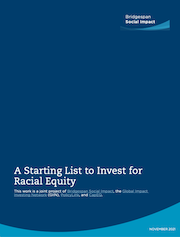
This work is a joint project of Bridgespan Social Impact, the Global Impact Investing Network (GIIN), PolicyLink, and CapEQ.
Since the social unrest over racial injustice in the summer of 2020, philanthropists, corporations, and impact...
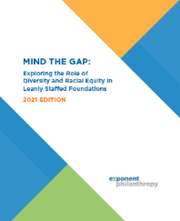
This survey shows a clear relationship between a focus on racial equity and good grantmaking and governance practices. Even though a growing number of funders are focusing on racial equity, foundation boards and staff lack racial diversity. To be...
Mismatched: Philanthropy’s Response to the Call for Racial Justice is the most comprehensive assessment of racial equity and racial justice funding to date, providing a detailed analysis of funding from 2015–2018 and a preliminary analysis for 2020....
Governing by-laws for the Council of New Jersey Grantmakers.
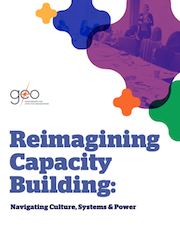
Strengthening nonprofit organizations is not just a nice-to-have but an essential part of our work as grantmakers to ensure that nonprofits have the resources they need to address today’s most pressing social concerns. Indeed, the vast majority of...
Learn how you can register for events online, search the member directory for organizations and colleagues who have the same interests, and update your profile.
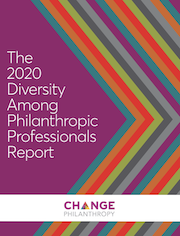
This second edition of the Diversity Among Philanthropic Professionals (DAPP) Report offers a snapshot of the philanthropic sector’s workforce in a very specific space and time — in the chaotic year that was 2020. The DAPP report aims to help the...
A brief guide for funders on how to partner with faith-inspired grantees with clear boundaries and integrity. It is designed for both funders new to the space, and those who would like to improve their working relationships with current faith-inspired...
The Foundation Legal Help Desk is designed to provide community, private and family foundations with access to answers to legal questions related to the operations of a foundation. The foundation world is a complex field that requires specialized...
Two different CNJG members queried the CEO listserve on how/when/how to return to the office following the COVID-19 pandemic. CNJG staff compiled the answers from the responding members removing identifying information of the respondents.
Independent Sector, in partnership with Edelman Data & Intelligence, is releasing this second annual report of survey findings that explore the nuances of trust in American nonprofit and philanthropic organizations.
The Robert Wood Johnson Foundation published this collection of resources, perspectives, and articles on how racism affects our collective and individual health.
Responding to the urgency of this moment in time, Asset Funder Network’s new brief is reimagining and building on past recommendations to map more just paths to economic resilience moving forward.
To bring the framework and...
This “How to Collect and Share DEI Data” guide is a resource for the field and has been written with nonprofits who want to start collecting their organization’s data in mind. The questions and choices of answers have been carefully considered with...
The 2021 CEO Blueprint for Racial Equity will guide you beyond diversity and inclusion commitments to the heart of the business opportunity ahead: addressing the intended and unintended impacts of your products, services, operations, policies, and...
The Johnson Center for Philanthropy has developed this new Program Officer Competency Model©. A competency model delineates the knowledge, skills, abilities, and other characteristics (KSAOs) that are required for effective performance in a particular...
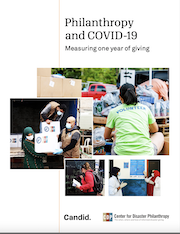
As of February 22, 2021, the coronavirus pandemic has claimed the lives of more than 2.5 million people around the world, with an additional 110 million people infected. And while data such as this serves an enormous purpose in understanding the scale...
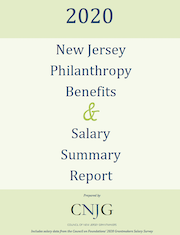
The 2020 New Jersey Philanthropy Benefits & Salary Report provides a valuable benchmarking resource. Developed and compiled for CNJG members exclusively, the report presents comprehensive benefits data specific to New Jersey's grantmaking...
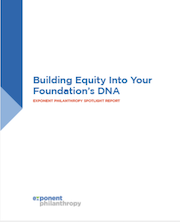
Funders are being asked to show how they are addressing social inequities by specifying what they do and who they are. How does philanthropy begin to embed equity into grantmaking, policies, and culture?
Healthy Communities...
United Philanthropy Forum is committed to advancing racial equity in philanthropy. We provide space for our members to connect, learn and share together on how to effectively address racial equity in their work as philanthropy-serving organizations (...
